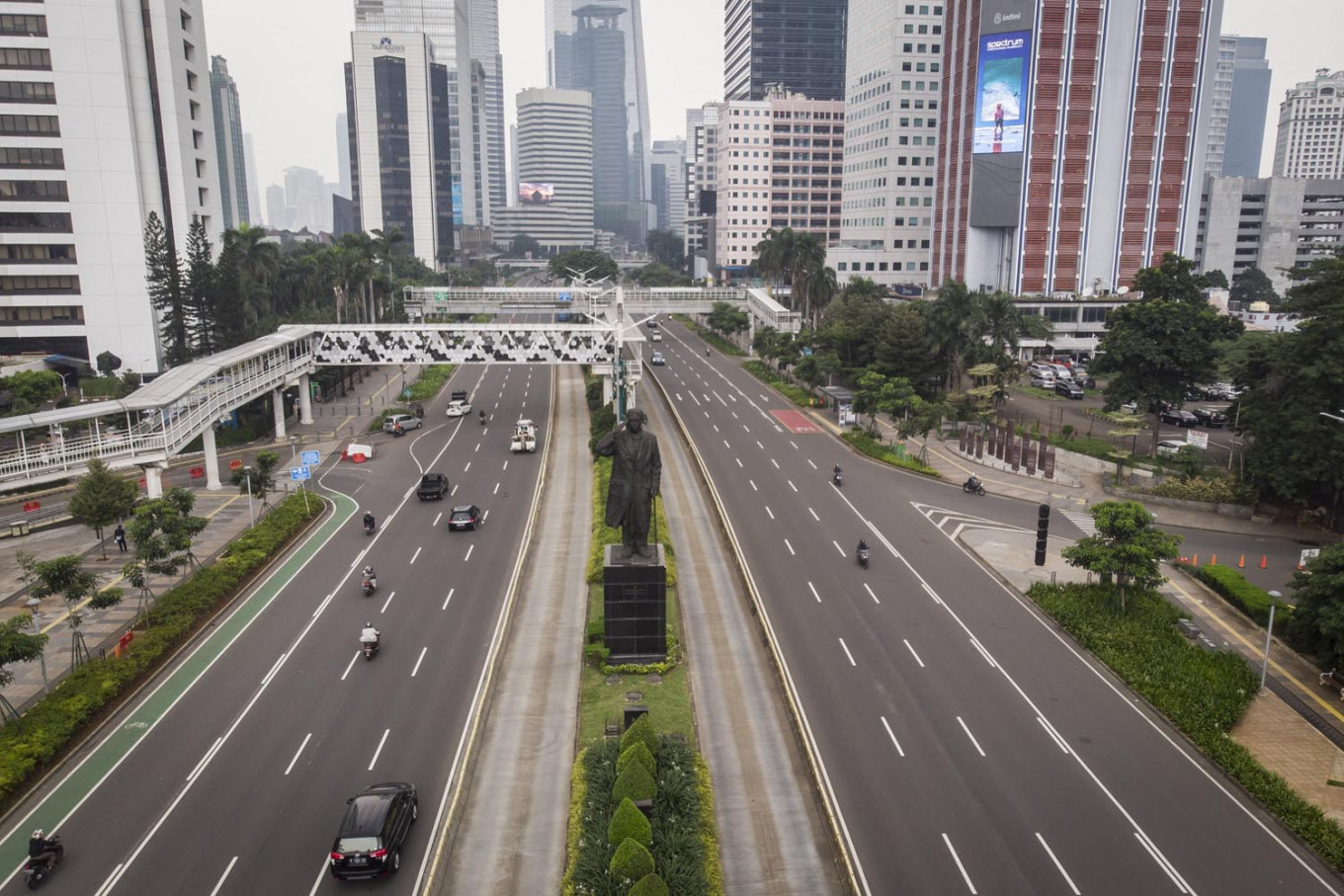Popular Reads
Top Results
Can't find what you're looking for?
View all search resultsPopular Reads
Top Results
Can't find what you're looking for?
View all search resultsCoronavirus lockdowns make cities more walkable
Change text size
Gift Premium Articles
to Anyone
 Aerial view of deserted Jl Sudirman, major thoroughfare in Jakarta, Indonesia on Saturday. Cities under lockdown to stop the spread of the coronavirus are making more room on their streets for pedestrians, fulfilling a long-standing demand by residents for more walkability that could be hard to reverse (Antara/Dhemas Reviyanto)
Aerial view of deserted Jl Sudirman, major thoroughfare in Jakarta, Indonesia on Saturday. Cities under lockdown to stop the spread of the coronavirus are making more room on their streets for pedestrians, fulfilling a long-standing demand by residents for more walkability that could be hard to reverse (Antara/Dhemas Reviyanto)
C
ities under lockdown to stop the spread of the coronavirus are making more room on their streets for pedestrians, fulfilling a long-standing demand by residents for more walkability that could be hard to reverse, urban experts said on Monday.
More than 720,000 people across the world have been infected by the coronavirus and about 33,000 have died, according to a Reuters tally.
With lockdowns or restrictions on movement in hundreds of cities, residents are often still allowed to occasionally go outside to run, walk or cycle, as long as they practice social distancing, or keep two meters from each other.
While this has led to overcrowding in parks in several cities, authorities in Toronto, New York and Philadelphia have barred traffic from some streets so more people can walk safely.
"Making cities more accessible to pedestrians now is necessary because people want to feel connected, get some exercise, and feel a little better about a very challenging situation," said Tony Matthews, a lecturer in urban and environmental planning at Australia's Griffith University.
"Many people may not want to give their streets back to heavy traffic volumes after this, so there will be a lot more advocacy for urban walkability," he told the Thomson Reuters Foundation.
Walking not only has physical and emotional benefits, but walkability - which considers safety, comfort and health - is also good for city economies and is key to social connectedness, research has shown.
But while urban planners have long been working to increase walkability, the challenge has always been competing with the dominance of vehicle traffic, Matthews said.
Reduced vehicle traffic in cities now has given authorities a chance to prioritize pedestrians, possibly for the first time in decades.
In Toronto and Vancouver, officials are looking into closing some parts of their streets to vehicles, while New York has closed some of its streets to vehicle traffic to allow more room for pedestrians.
Developing Asian cities, with a few exceptions, are less walkable, with pedestrians often forced to share narrow, crumbling pavements - where they exist - with vendors, motorbikes and stray dogs and cats.
But walkability is even more critical in these crowded cities, as there are few open spaces, said landscape architect Kotchakorn Voraakhom in Bangkok.
"People want to get out and exercise, and it is important that there are accessible, healthy, welcoming spaces for them to do so," she said.
"We have prioritized cars for so long now, we forgot all about pedestrians. But that is beginning to change," she said.
Bangkok began to open up some of its busiest streets to pedestrians last December, though the move was largely targeted at tourists. While Jakarta has expanded its car-free Sunday to more streets in the congested Indonesian capital.
The pandemic has made authorities realize the importance of healthy urban environments, said David Sagita, a public space specialist at United Cities and Local Governments, an umbrella organization of cities and regional authorities.
"Residents and authorities are seeing the need for cleaner, greener, healthier cities - which includes more open spaces and less traffic," he said.
"This experience will change urban planning as we know it."









